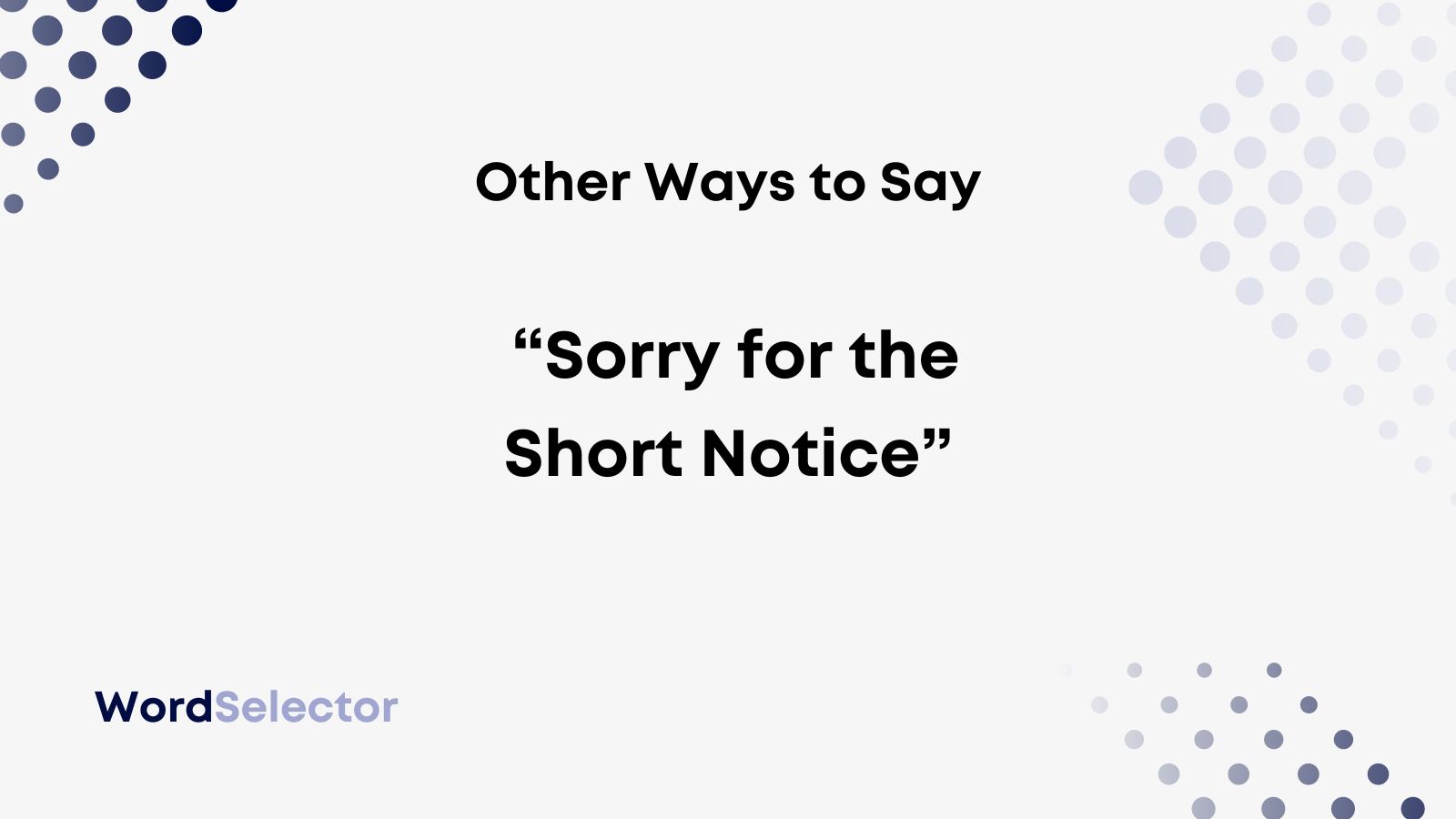Giving someone short notice can cause problems with schedules. You don’t want to leave something until the last minute because it might end up causing more inconvenience than it’s worth.
However, sometimes, you simply can’t avoid short notice.
So, it’s worth knowing how to say “sorry for the short notice” in a business email. This article has gathered some of the best synonyms to help.
Other Ways to Say “Sorry for the Short Notice”
- I regret the lack of advance notice
- Apologies for leaving it so late
- Please forgive me for the short notice
- Sorry about the lack of notice
- Sorry for the late notice
- I’m sorry for giving minimal warning
- Sorry for the unexpected update
- I apologize for the last-minute notice
- Sorry about the abrupt request
- My apologies for the sudden notice
- Sorry for the last-minute request
- Sorry about how sudden this is
- Please accept my apologies for the brief notice
KEY TAKEAWAYS
- “Sorry for the short notice” is a polite and formal way to apologize for late information.
- “I regret the lack of advance notice” works well as a formal alternative.
- You can say “apologies for leaving it so late” as a more informal synonym.
Keep reading to find out more about the most useful phrases above. We’ve explored the best formal and informal options to help you understand them better.
You can also skip to the final section to learn whether it’s correct to say “sorry for the short notice.”
I Regret the Lack of Advance Notice (Formal)
When giving short notice leave, you should be as respectful and direct as possible. And that’s where “I regret the lack of advance notice” comes in.
Sometimes, you can’t avoid changing your plans if something comes up in the workplace. If you change plans around, it may affect those you’ve already set up with other people.
So, when you know you have to mess with an original plan, you should use this phrase. It shows you how to apologize for short notice in an email.
Above all else, it’s formal and polite. You can’t go wrong with it.
It’s also quite final. It implies you cannot change the new timings of something. So, it works best when you’re letting someone know about short notice out of courtesy rather than telling them they can change it.
This email sample should also help you with it:
Dear Ms. Cook,
I regret the lack of advance notice. However, I will need to bring our meeting forward by a few hours.
All the best,
Sam Wallace
Apologies for Leaving It So Late (Informal)
You can write “apologies for leaving it so late” in slightly more informal cases. Don’t get us wrong; it still works in emails, but it works best when you know the recipient well.
For instance, you can use it when emailing your boss. If you have a decent working relationship with them, this could be a good way to mix up their schedule.
Remember, your boss is always going to be busy. So, any time you have to give them short notice, you’re most likely messing up their schedule.
That’s why we recommend this phrase. It’s respectful yet friendly. It allows you to apologize directly for changing plans outside of your control.
Here’s a helpful email example to show you how it works:
Hi Lewis,
Apologies for leaving it so late, but are you free to discuss this at lunchtime today? I look forward to hearing from you.
Best regards,
Adam Warrington
Is It Correct to Say “Sorry for the Short Notice”?
It is correct to say “sorry for the short notice.” It’s a great polite and formal phrase that shows you regret leaving something until the last minute.
We recommend using it when forced to change someone’s plans. It shows you don’t want to cause any problems for them, but you simply can’t avoid it.
For example:
Dear Mr. Smith,
Sorry for the short notice, but I’m going to need your help fulfilling this project.
All the best,
Harry Keane
You can also use either of the following variations:
- Sorry for the short notice
- Sorry for the late notice
Both phrases imply that you’ve left it until the last minute to ask someone for help.
Generally, you should include “the short notice” to show that you didn’t mean to inconvenience someone. Removing “the” makes it sound more jarring.
For instance:
- Correct: I’m sorry for the short notice.
- Incorrect: I’m sorry for short notice.

